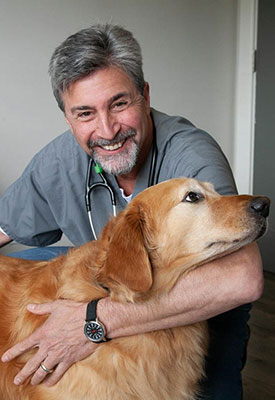Wellbeing in the veterinary workplace: Collaboration and culture are key
President’s Column: Dr. John de Jong
 In the workplace, wellbeing plays an important role in determining not only individual health and happiness, but also job satisfaction and productivity.
In the workplace, wellbeing plays an important role in determining not only individual health and happiness, but also job satisfaction and productivity.
In recent years, more veterinary employers have been showing an interest in wellbeing and offering access to supplemental benefits, such as onsite yoga sessions and vouchers for health clubs. These employee perks are terrific ways to enhance both individual and group wellbeing. But there’s more to truly achieving a “well” workplace. Making a lasting difference in employee wellbeing requires a holistic approach—one that helps create, promote, and support consistent and intentional healthy habits in the workplace.
I am very pleased to share with you that the AVMA is creating a veterinary workplace wellbeing program exclusively for our members. Made possible by a generous gift of $100,000 from Merck Animal Health and the Merck Foundation, this program will greatly enhance our existing wellbeing initiatives.
The program is aimed at promoting workplace wellbeing for the entire veterinary team. It will provide veterinary professionals online access to a workplace wellbeing self-assessment tool as well as skills-based educational modules that address suicide prevention, self-care, fostering a culture of wellbeing, and the role of diversity and inclusion in workplace wellbeing. The fact that wellbeing is linked to the choices we make, and requires prioritization and personal accountability related to those choices, is one of the underlying messages this program drives home.

We look forward to launching the Veterinary Workplace Wellbeing Program in the first quarter of 2019.
The AVMA is also proud to have collaborated with Merck Animal Health on the Merck Animal Health Veterinary Wellbeing Study released earlier this year. The study is the first of its kind to measure veterinary wellbeing using widely accepted scientific methods and a truly representative population sample. While further analysis of the results continues, the study will be the subject of an AVMA Lead & Learn webinar on November 13 at noon Central Time. Participants will gain an understanding of the current state of mental health and wellbeing among U.S. veterinarians, learn what factors both negatively and positively contribute to mental health and wellbeing, and learn action steps that can be taken to improve mental health and wellbeing at the organizational, practice, and individual levels. Secure your spot for this important webinar.
You may recall that early last year the AVMA and our insurance trusts, AVMA Life and AVMA PLIT, joined together to offer QPR (“Question, Persuade, Refer”) gatekeeper suicide-prevention training to AVMA and Student AVMA members. QPR teaches people without a professional mental health background how to recognize the signs that someone may be considering suicide. Perhaps even more importantly, it also focuses on the importance of establishing a dialogue with the person and guiding him or her to seek professional help. Although it is not a substitute for professional assistance, QPR training can be a critical tool to help save lives, and it only takes about an hour of your time to complete. Please take this important training to learn how you can reach out and help those who are struggling.
The AVMA offers comprehensive wellbeing resources on our website. You’ll find our self-assessment tool; information on topics such as work and compassion fatigue, stress management, financial wellbeing, work-life balance, physical health, and self-care; and helpful tips to begin nurturing your emotional wellbeing.
The AVMA values our relationships with industry partners, allied organizations, stakeholders across the profession, and other like-minded organizations in our focus to make veterinary medicine a stronger and healthier profession. A healthy, thriving veterinary team is vital to our profession and to the care of the animals we’re committed to protect. Continued collaboration will help make a difference in the lives of those who need our support.

Comments
Add New Comment